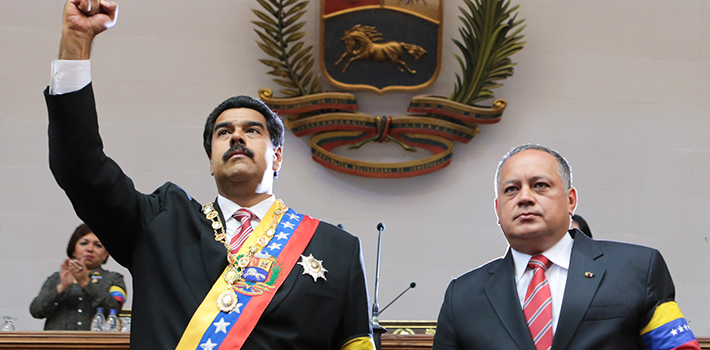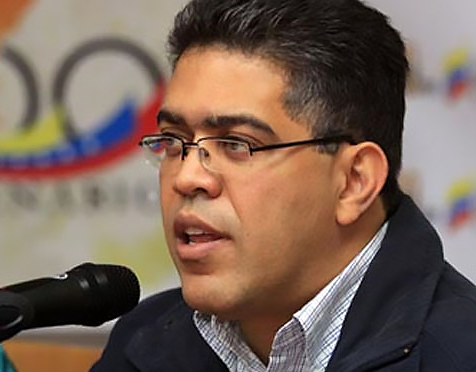
EspañolThe Castro-Chavista diplomatic machine has begun to take action, even though the Obama administration has yet to make a decision whether to impose sanctions against officials of the Maduro regime involved in cases of corruption and human rights violations. However, the mere possibility that they may launch these sanctions, thanks to bipartisan pressure building up in the US Congress, has mobilized the government of Nicolás Maduro on a new international offensive.
The potential sanctions will not be aimed at the Venezuelan people; they do not involve an economic embargo, or military action. They are individual sanctions at specific officials who have committed crimes in Venezuela and abroad. However, Maduro’s government portrays them as actions that would affect “officials who have been leading the restoration of public order and guaranteeing peace and stability for the Venezuelan people,” referring to the protests led by students and political opponents that have been on the rise throughout Venezuela since February.
As such, these are not the sort of sanctions that would violate the principle of nonintervention in the internal affairs of our country, as is being sold by the Venezuelan government and Foreign Minister Elías Jaua. Not at all. If initiated, they would form part of a sovereign and independent foreign policy, much like the various policy decisions Hugo Chávez and Nicolás Maduro undertook toward other countries in the past. Recall, for example, the time Chávez broke trade and diplomatic relations with Colombia in 2008, and then sent armed forces to border as a clear threat of military intervention — all in the name of solidarity with Ecuador.
Given the very specific interpretation of non-intervention by Castro-Chavistas, would the government’s actions against Colombia not be considered interventionist? What about the other similar actions taken over the last 15 years, like freezing relations with the United States and the expulsion of US diplomats from the embassy in Caracas, or the countless warmongering sermons and verbal aggression expressed at other nations? Would this be considered interventionist policies? Of course not.
Whether they were actually in our national interest or not, whether we liked them or not, these policies do not constitute a violation of the principle of nonintervention. They were unilateral, sovereign, and independent actions taken on the part of the Chavista regime. That is not to say, of course, that there have not been clear instances of interventionist policy action undertaken by the Venezuelan government. A perfect example is when then-Foreign Minister Nicolás Maduro traveled to Paraguay to address a group of soldiers and have them defend deposed former President Fernando Lugo, as clearly demonstrated by video footage provided by the defense minister of Paraguay in 2012.

Nevertheless, that is the message Foreign Minister Elías Jaua arrived with last week in the Galápagos Islands, Ecuador, as he attended the ministerial meeting of the Union of South American Nations (UNASUR). The foreign ministers of Colombia, Brazil, and Ecuador, which form the commission designated by that organization to accompany the dialogue process in Venezuela, met there to present a report on its progress. The fact that the dialogue is now frozen, however, wasn’t an obstacle for the ministers to describe it as “positive.”
Even worse, UNASUR then committed a legal and political aberration when they condemned possible US sanctions against Venezuela, therefore playing along with the dictatorial Venezuelan regime. Without any shame, the foreign ministers of the increasingly politicized multilateral bloc said in their statement that the sanctions on Venezuelan officials would “violate the principle of nonintervention in the affairs of other nations, and affect the process of dialogue between the government of President Nicolás Maduro and the Venezuelan opposition.”
After gaining the political support he was looking for in Galápagos, Jaua went on a tour through Algeria, Russia, Bolivia, and Portugal. Jaua said, clearly and publicly, that he would launch a diplomatic offensive to denounce US “interference” in the internal affairs of Venezuela. So far, there hasn’t been any response to his statement by any democratic government or international institution.
Algeria was the first country where the foreign minister enthusiastically presented his offensive, timed along with the ministerial meeting of the Non-Aligned Movement scheduled for May 28. Although we still don’t know their answer to Jaua’s initiative, there is no doubt that it will be positive. At the opening of the meeting — to be followed by a summit of heads of state in Venezuela in 2015, and therefore organized by the Maduro government — Bolivian President Evo Morales spoke in favor of the Castro-Chavista regime, affirming that the United States “is driving an internal conflict in Venezuela in order to launch a military intervention.”
We can already imagine the strong support that Jaua will receive in Bolivia and Russia. It’s too bad Jaua did not also present his arguments to the democratic governments of the world. He will only present them in Portugal, whose socialist government has significant economic ties with Venezuela. It would be instructive for him to see how truly democratic presidents would respond to the Madurista regime’s proposal.
 Versión Español
Versión Español












